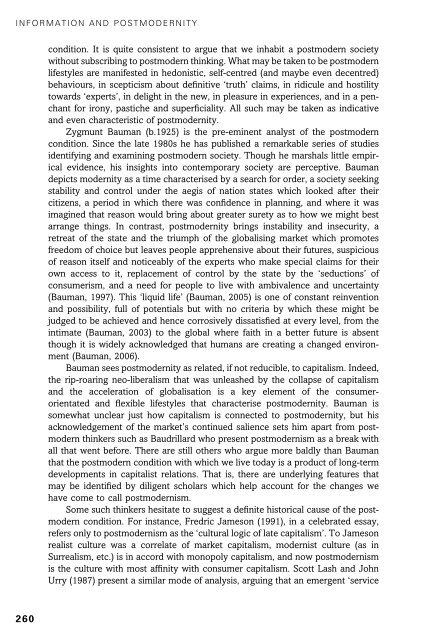Theories of the Information Society, Third Edition - Cryptome
Theories of the Information Society, Third Edition - Cryptome
Theories of the Information Society, Third Edition - Cryptome
Create successful ePaper yourself
Turn your PDF publications into a flip-book with our unique Google optimized e-Paper software.
INFORMATION AND POSTMODERNITY<br />
condition. It is quite consistent to argue that we inhabit a postmodern society<br />
without subscribing to postmodern thinking. What may be taken to be postmodern<br />
lifestyles are manifested in hedonistic, self-centred (and maybe even decentred)<br />
behaviours, in scepticism about definitive ‘truth’ claims, in ridicule and hostility<br />
towards ‘experts’, in delight in <strong>the</strong> new, in pleasure in experiences, and in a penchant<br />
for irony, pastiche and superficiality. All such may be taken as indicative<br />
and even characteristic <strong>of</strong> postmodernity.<br />
Zygmunt Bauman (b.1925) is <strong>the</strong> pre-eminent analyst <strong>of</strong> <strong>the</strong> postmodern<br />
condition. Since <strong>the</strong> late 1980s he has published a remarkable series <strong>of</strong> studies<br />
identifying and examining postmodern society. Though he marshals little empirical<br />
evidence, his insights into contemporary society are perceptive. Bauman<br />
depicts modernity as a time characterised by a search for order, a society seeking<br />
stability and control under <strong>the</strong> aegis <strong>of</strong> nation states which looked after <strong>the</strong>ir<br />
citizens, a period in which <strong>the</strong>re was confidence in planning, and where it was<br />
imagined that reason would bring about greater surety as to how we might best<br />
arrange things. In contrast, postmodernity brings instability and insecurity, a<br />
retreat <strong>of</strong> <strong>the</strong> state and <strong>the</strong> triumph <strong>of</strong> <strong>the</strong> globalising market which promotes<br />
freedom <strong>of</strong> choice but leaves people apprehensive about <strong>the</strong>ir futures, suspicious<br />
<strong>of</strong> reason itself and noticeably <strong>of</strong> <strong>the</strong> experts who make special claims for <strong>the</strong>ir<br />
own access to it, replacement <strong>of</strong> control by <strong>the</strong> state by <strong>the</strong> ‘seductions’ <strong>of</strong><br />
consumerism, and a need for people to live with ambivalence and uncertainty<br />
(Bauman, 1997). This ‘liquid life’ (Bauman, 2005) is one <strong>of</strong> constant reinvention<br />
and possibility, full <strong>of</strong> potentials but with no criteria by which <strong>the</strong>se might be<br />
judged to be achieved and hence corrosively dissatisfied at every level, from <strong>the</strong><br />
intimate (Bauman, 2003) to <strong>the</strong> global where faith in a better future is absent<br />
though it is widely acknowledged that humans are creating a changed environment<br />
(Bauman, 2006).<br />
Bauman sees postmodernity as related, if not reducible, to capitalism. Indeed,<br />
<strong>the</strong> rip-roaring neo-liberalism that was unleashed by <strong>the</strong> collapse <strong>of</strong> capitalism<br />
and <strong>the</strong> acceleration <strong>of</strong> globalisation is a key element <strong>of</strong> <strong>the</strong> consumerorientated<br />
and flexible lifestyles that characterise postmodernity. Bauman is<br />
somewhat unclear just how capitalism is connected to postmodernity, but his<br />
acknowledgement <strong>of</strong> <strong>the</strong> market’s continued salience sets him apart from postmodern<br />
thinkers such as Baudrillard who present postmodernism as a break with<br />
all that went before. There are still o<strong>the</strong>rs who argue more baldly than Bauman<br />
that <strong>the</strong> postmodern condition with which we live today is a product <strong>of</strong> long-term<br />
developments in capitalist relations. That is, <strong>the</strong>re are underlying features that<br />
may be identified by diligent scholars which help account for <strong>the</strong> changes we<br />
have come to call postmodernism.<br />
Some such thinkers hesitate to suggest a definite historical cause <strong>of</strong> <strong>the</strong> postmodern<br />
condition. For instance, Fredric Jameson (1991), in a celebrated essay,<br />
refers only to postmodernism as <strong>the</strong> ‘cultural logic <strong>of</strong> late capitalism’. To Jameson<br />
realist culture was a correlate <strong>of</strong> market capitalism, modernist culture (as in<br />
Surrealism, etc.) is in accord with monopoly capitalism, and now postmodernism<br />
is <strong>the</strong> culture with most affinity with consumer capitalism. Scott Lash and John<br />
Urry (1987) present a similar mode <strong>of</strong> analysis, arguing that an emergent ‘service<br />
260
















